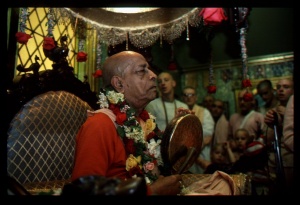CC Madhya 20.102 (1975)

A.C. Bhaktivedanta Swami Prabhupada
Below is the 1996 edition text, ready to be substituted with the 1975 one using the compile form.
TEXT 102
- ‘ke āmi’, ‘kene āmāya jāre tāpa-traya’
- ihā nāhi jāni—‘kemane hita haya’
SYNONYMS
ke āmi—who am I; kene—why; āmāya—unto me; jāre—give trouble; tāpa-traya—the three kinds of miserable conditions; ihā—this; nāhi jāni—I do not know; kemane—how; hita—my welfare; haya—there is.
TRANSLATION
“Who am I? Why do the threefold miseries always give me trouble? If I do not know this, how can I be benefited?
PURPORT
The threefold material miseries are miseries arising from the body and the mind, miseries arising from dealings with other living entities, and miseries arising from natural disturbances. Sometimes we suffer bodily when we are attacked by a fever, and sometimes we suffer mentally when a close relative dies. Other living entities also cause us misery. There are living entities born of the human embryo, of eggs, perspiration and vegetation. Miserable conditions brought about by natural catastrophes are controlled by the higher demigods. There may be severe cold or thunderbolts, or a person may be haunted by ghosts. These threefold miseries are always before us, and they entrap us in a dangerous situation. Padaṁ padaṁ yad vipadām (SB 10.14.58). There is danger in every step of life.